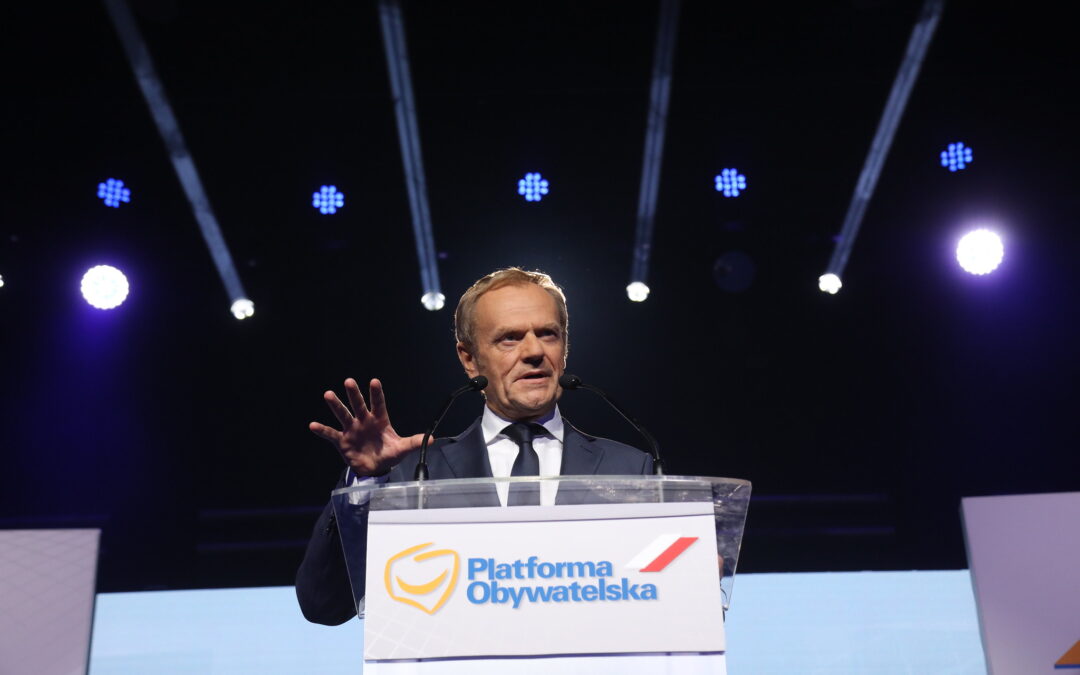Poland’s largest opposition party, the centrist Civic Platform (PO), has announced plans to offer interest-free mortgages for under-45s buying their first home as well as state subsidies towards those renting if it wins power at this autumn’s elections.
“We will be proposing policies that will actually make housing a right, not a commodity,” said PO leader Donald Tusk, using a slogan that has also been adopted by The Left (Lewica), the second-largest opposition group, as well as the national-conservative Law and Justice (PiS) government.
“No one is going to give housing away for free, but an honest government must recognise that every Polish family has a right to housing,” he added.
Mieszkanie musi być PRAWEM, a nie towarem!
Wprowadzimy #KredytZeroProcent dla ludzi, którzy nie ukończyli 45 roku życia i chcieliby kupić swoje pierwsze mieszkanie! #TuJestPrzyszłość pic.twitter.com/ioodzvafvB
— PlatformaObywatelska (@Platforma_org) February 27, 2023
Access to the housing market, especially for first-time buyers, has become a big issue ahead of the elections amid record property prices, rising interest rates over the past year, and a shortage of available properties. Demand for housing has increased further with the arrival of over 1.3 million Ukrainian refugees.
“If you took a loan for half a million zlotys for a 60-square-metre flat for 25 years, the instalment is probably around 4,000 zlotys, maybe 4,200 zlotys,” said Tusk during a meeting in the central Polish city of Pabianice. “You are paying interest for many years without starting to pay down the principal.”
“The introduction of the 0% mortgage will mean an instalment of around 1,700 zloty and this would go to the capital repayment, not an endless repayment of interest,” he added.
Sales of new homes fell 38% in Poland's seven largest cities last year.
That did not, however, translate into a drop in prices, which increased by 9% per square metre https://t.co/rXV6F8XH68
— Notes from Poland 🇵🇱 (@notesfrompoland) January 4, 2023
Tusk assured that a mechanism would be prepared to ensure that banks were not “at particular risk”, though did not provide any details. He also announced that the PO’s proposal envisages rental subsidies of 600 zloty (€127), though again without any further details.
His party also wants its housing programme to subsidise the cost of renovating housing that is uninhabitable or otherwise in need of urgent improvement. The 2021 national census found that almost two million dwellings in Poland – around 12% of the total number – were uninhabited.
Other parties have over the last year also proposed solutions to support first-time buyers. The ruling PiS party wants to introduce a “safe mortgage” programme guaranteeing borrowers that interest rates would stay at 2%.
The difference between the market interest rate and the interest rate under the programme would be reimbursed to the banks from the treasury for a period of up to 10 years.
There were 1.8 million uninhabited dwellings (almost 12% of the total number) in Poland last year, despite the country facing a housing shortage, the national census found.
In Warsaw alone, 207,000 dwellings (a fifth of all homes) were standing empty https://t.co/GIavVL2akg
— Notes from Poland 🇵🇱 (@notesfrompoland) October 21, 2022
The Left proposes that, in addition to fixed interest rates, the government should set up a State Housing Agency that would build 300,000 housing units between 2025 and 2029.
“The housing crisis has to be solved from the supply side,” said Adrian Zandberg, one of the leaders of The Left in response to PO’s proposals yesterday. “In Poland, this will not be done by the market. It can be done by the state and local governments – by building rental housing.”
“Naively pumping billions into the current system will only fatten the banks and raise housing prices,” he added. “Those who don’t understand this will waste money.”
Another leader from The Left, Magdalena Biejat, said that Tusk must have misunderstood the phrase “housing is a right, not a commodity”, and noted that his proposal is similar to that of the ruling party.
“This is rehashing once again the same idea, which has not worked and has no right to work,” she said on Twitter. “When we subsidise loans banks raise margins, next step developers raise margins, which means that housing becomes more expensive. This happens every time.”
Of the 100,000 new homes for middle- and low-income families that the government promised by the end of 2019, only 15% have been built.
Meanwhile, Poland has an estimated deficit of 2.2 million homes, writes Anna Pommersbach of @KlubJagiellonsk https://t.co/MD3ottsMf0
— Notes from Poland 🇵🇱 (@notesfrompoland) April 15, 2022
Estimates of Poland’s housing shortage vary, from around 650,000 units, according to the development ministry, to as much as 4 million units, according to Pekao, a bank.
Up until recently, residential developers saw soaring demand, with a record amount of new housing delivered in 2021, supported by record low-interest rates introduced during the covid pandemic. This trend, however, halted as the central bank started raising interest rates to combat inflation.
Its key interest rate has been at 6.75% since September last year, up from the record low of 0.1% at the height of the pandemic. This rise slashed demand for mortgages by as much as 70%.

Alicja Ptak is deputy editor-in-chief of Notes from Poland and a multimedia journalist. She has written for Clean Energy Wire and The Times, and she hosts her own podcast, The Warsaw Wire, on Poland’s economy and energy sector. She previously worked for Reuters.




















